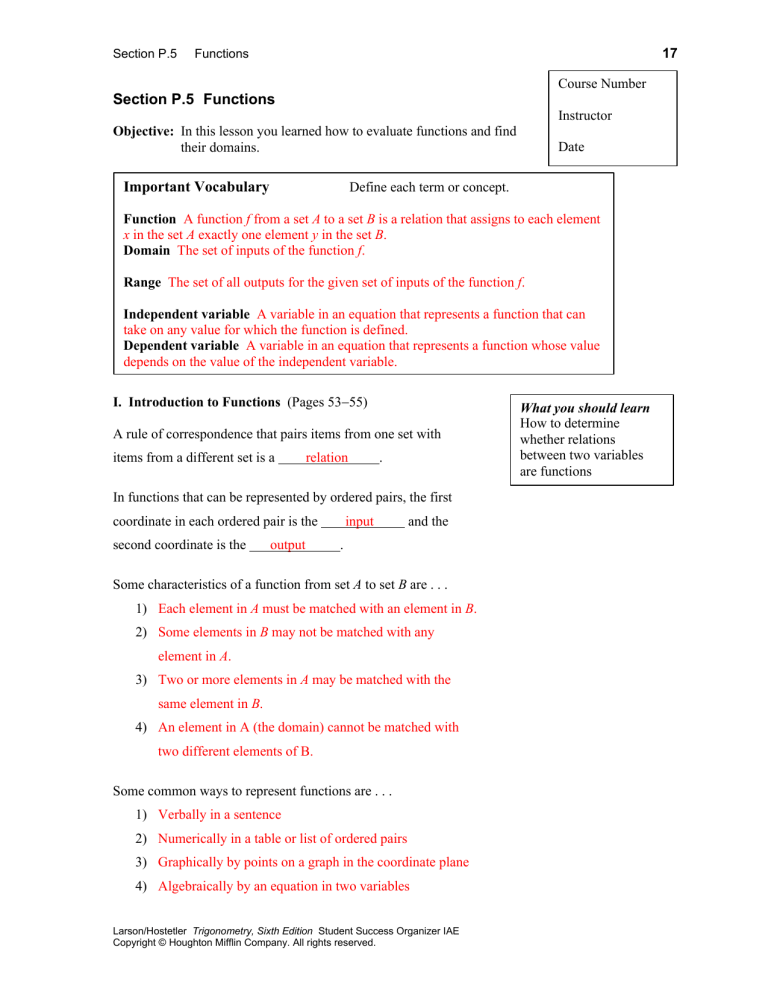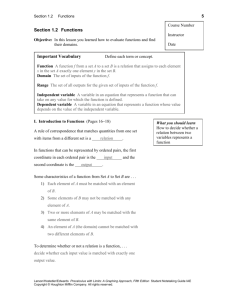
Section P.5 17 Functions Course Number Section P.5 Functions Instructor Objective: In this lesson you learned how to evaluate functions and find their domains. Important Vocabulary Date Define each term or concept. Function A function f from a set A to a set B is a relation that assigns to each element x in the set A exactly one element y in the set B. Domain The set of inputs of the function f. Range The set of all outputs for the given set of inputs of the function f. Independent variable A variable in an equation that represents a function that can take on any value for which the function is defined. Dependent variable A variable in an equation that represents a function whose value depends on the value of the independent variable. I. Introduction to Functions (Pages 53−55) A rule of correspondence that pairs items from one set with items from a different set is a relation . In functions that can be represented by ordered pairs, the first coordinate in each ordered pair is the second coordinate is the output input and the . Some characteristics of a function from set A to set B are . . . 1) Each element in A must be matched with an element in B. 2) Some elements in B may not be matched with any element in A. 3) Two or more elements in A may be matched with the same element in B. 4) An element in A (the domain) cannot be matched with two different elements of B. Some common ways to represent functions are . . . 1) Verbally in a sentence 2) Numerically in a table or list of ordered pairs 3) Graphically by points on a graph in the coordinate plane 4) Algebraically by an equation in two variables Larson/Hostetler Trigonometry, Sixth Edition Student Success Organizer IAE Copyright © Houghton Mifflin Company. All rights reserved. What you should learn How to determine whether relations between two variables are functions 18 Chapter P To determine whether a relation is a function, . . . Prerequisites decide whether each input value is matched with exactly one output value. If any input value of a relation is matched with two or more output values, . . . the relation is not a function. Example 1: Decide whether the table represents y as a function of x. x 0 2 4 −3 −1 y 5 5 3 14 − 12 Yes, this table represents y as a function of x. II. Function Notation (Pages 55−56) The symbol f(x) is function notation for the value of f at x or f of x, used to describe y as a function of x. In this case, f is the name of the function and f(x) What you should learn How to use function notation and evaluate functions is the value of the function at x. Example 2: If f ( w) = 4 w 3 − 5w 2 − 7 w + 13 , describe how to find f (−2) . Replace each occurrence of w in the function by − 2 and evaluate the resulting numerical expression. A piecewise-defined function is . . . a function that is defined by two or more equations, each over a specified domain. III. The Domain of a Function (Page 57) The implied domain of a function defined by an algebraic expression is . . . What you should learn How to find the domains of functions the set of all real numbers for which the expression is defined. For example, the implied domain of the function f ( x) = 5 x − 8 is . . . the set of all real numbers greater than or equal to 8/5, or [8/5, ∞). Larson/Hostetler Trigonometry, Sixth Edition Student Success Organizer IAE Copyright © Houghton Mifflin Company. All rights reserved. Section P.5 19 Functions IV. Applications of Functions (Pages 58−60) What you should learn How to use functions to model and solve real-life problems A difference quotient is defined as . . . [f(x + h) − f(x)]/h, h ≠ 0. Describe a real-life situation which can be represented by a function. Answers will vary. Additional notes 5 -5 -3 y 5 y 5 3 3 3 1 1 1 -1 -1 1 3 5 x -5 -3 -1 -1 1 3 5 x -5 -3 -1 -1 -3 -3 -3 -5 -5 -5 Homework Assignment Page(s) Exercises Larson/Hostetler Trigonometry, Sixth Edition Student Success Organizer IAE Copyright © Houghton Mifflin Company. All rights reserved. y 1 3 5 x

